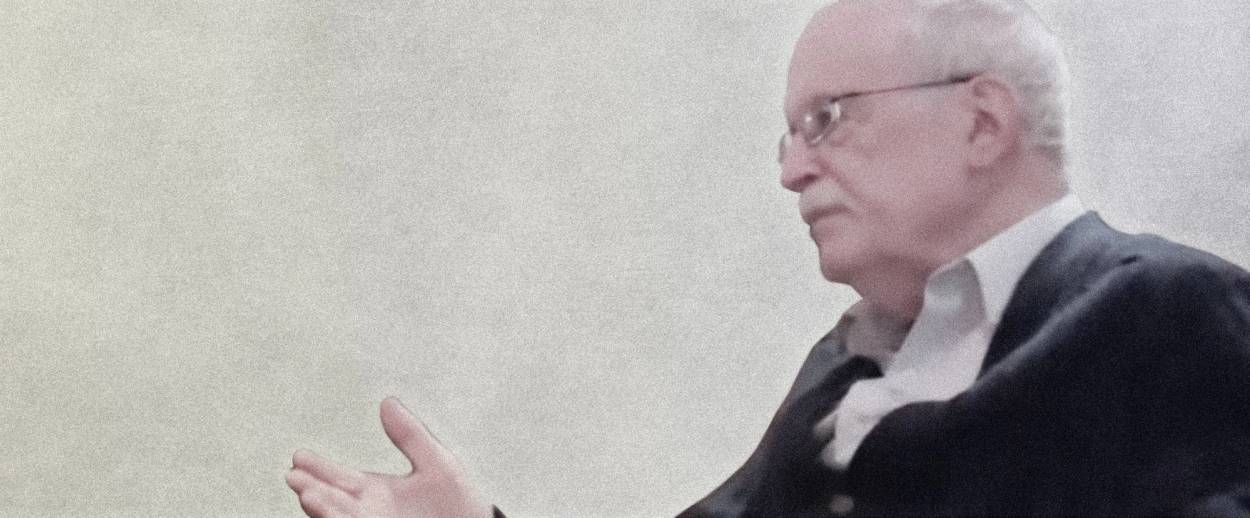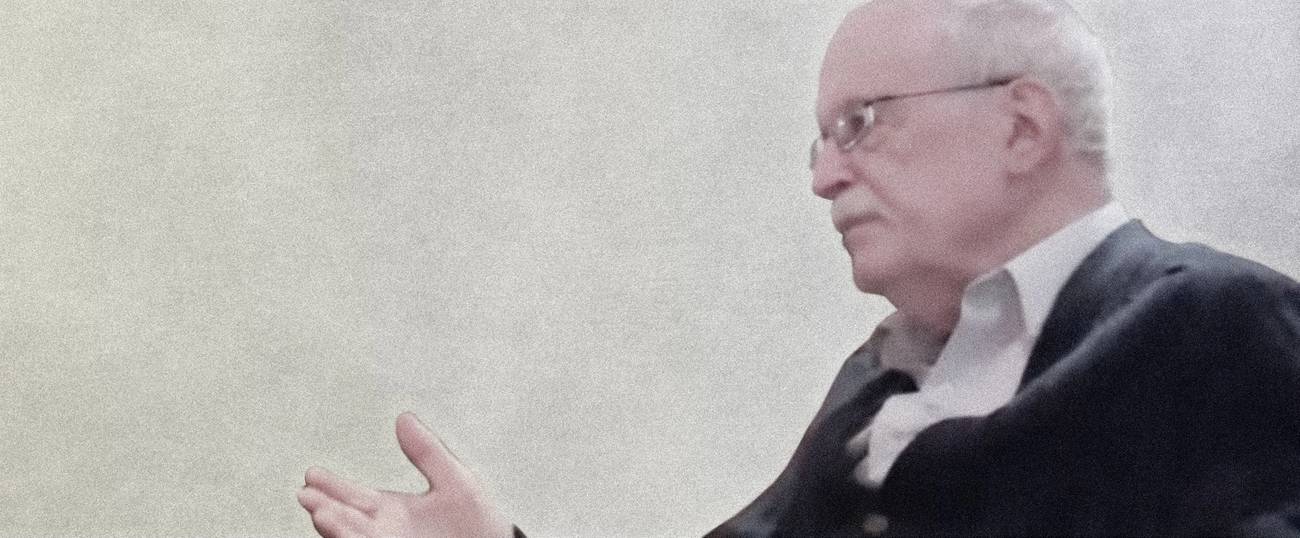Michael Wyschogrod, Dean of Orthodox Jewish Theologians, Dies at 87
The Jewish philosopher ‘looked at the world with irony but without a trace of rancor’




The Jewish philosopher Michael Wyschogrod died Dec. 17 at the age of 87, after a long illness. He was old enough to have stood with his father across the street from Berlin’s main synagogue as it burned on Kristallnacht, when the Brownshirts unrolled a Torah scroll in the street and charged passersby the equivalent of a dime to trample the length of it. Wyschogrod escaped Germany with his family early in 1939 just as the gates were closing, obtaining an American visa thanks to an uncle in Atlanta whose employer knew a U.S. senator. He was a brand plucked out of the fire. And he was, perhaps, our last living link to the engagement of yeshiva-educated Orthodox Jews with continental philosophy.
Educated at the Yiddish-speaking Orthodox day school Yeshiva Torah Vodaath in Brooklyn, Wyschogrod attended City College and then earned a Columbia doctorate with a dissertation on Kierkegaard and Heidegger. At the same time he attended Rav Joseph Soloveitchik’s Talmud class at Yeshiva University. He admonished observant Jews to master Western philosophy, the better to comprehend their own tradition, but he proposed a uniquely Jewish solution to the 20th-century crisis in Western philosophy. His influence was enormous; Rabbi Lord Jonathan Sacks once told me that Wyschogrod was the closest thing we have to a systematic theology of Judaism. But it was not as great as he hoped it would be in the community he averred would be the ultimate judge of his work, namely Torah-obedient Jews. That has changed in the last several years, and Wyschogrod’s numerous writings will guide Jewish scholars for years to come.
His favorite Christian philosopher, Søren Kierkegaard, pictured the “Knight of Faith” who is so secure in his relationship to God that his daily life becomes a continual source of joy. Wyschogrod was a knight of Kierkegaard’s order. In his wife, the distinguished philosopher Prof. Edith Wyschogrod, he found a lifelong soulmate as well as an intellectual peer. When Edith was offered a position at Rice University in Houston, Wyschogrod moved from the CUNY system to the University of Houston and was delighted to teach undergraduates who knew the Bible by heart. They had two children and five grandchildren.
Michael Wyschogrod looked at the world with irony but without a trace of rancor. Shortly before his final illness he took his grandchildren to Berlin to see where he spent his boyhood. Recalling Kristallnacht, he noted that the Berliners did not seem at all happy with the Nazis’ rampage. He joked about German anti-Semitism, formed close ties with German colleagues, and saw his major work published in German.
His doctoral dissertation became the first English-language work on the philosophy of Martin Heidegger, whose Nazi party membership (and refusal to apologize for it) remains a scandal in the philosophical world. Wyschogrod refused any contact with Heidegger but never joined in the ritual excoriation of the philosopher for his anti-Semitism. Far more interesting, Wyschogrod observed, is why Heidegger’s anti-Semitism was so muted; he refused for example to remove the dedication to his Jewish teacher Edmund Husserl from the 1935 edition of his principal work. It was a measure of Wyschogrod’s character that he found it more worthwhile to understand than to denounce.
God’s preferential love for Israel was the great theme of Wyschogrod’s own writing. Jewish history begins with an act of inexplicable love: God fell passionately in love with Abraham and for his sake loved his descendants. Wyschogrod’s most-read book, The Body of Faith, asserts that “Judaism is a religion of the body,” whose purpose is to sanctify the real, physical Jewish people so that it can be a fit vessel for God’s Indwelling (Shekhinah) in this world. His study of Kierkegaard and other Christian philosophers strengthened his argument that Judaism is an incarnational religion: The divine is physically present in the Jewish people. Without knowing the Christian concept of incarnation, Wyschogrod wrote, he would not have understood Jewish tradition as clearly.
His teacher Joseph Soloveitchik eschewed theological dialogue with Christians, although he encouraged dialogue on ethical and moral issues. Wyschogrod disagreed and made distinguished contributions over half a century to Jewish-Christian dialogue. Even if Christianity is wrong to worship a man-god, he argued, the Christian idea of Incarnation sheds light on a fundamental Jewish concept: that God’s Indwelling is present in the physical Jewish people. As the sages of antiquity said, the Shekhinah went into exile with the Jewish people after the destruction of the Temple.
Unlike Christian theologians, who characterize Judaic particularism in contrast to Christian universalism, Wyschogrod asserted that God’s first love for Israel did not exclude love for all humankind. On the contrary, “When we grasp that the election of Israel flows from the fatherhood that extends to all created in God’s image, we find ourselves tied to all men in brotherhood, as Joseph, favored by his human father, ultimately found himself tied to his brothers. And when man contemplates this mystery, that the Eternal One, the creator of heaven and earth, chose to become the father of his creatures instead of remaining self-sufficient unto himself, as is the Absolute of the philosophers, there wells up in man that praise that has become so rare yet remains so natural.”
Instead of Aristotle’s Unmoved Mover as depicted in the philosophical writings of Maimonides, Wyschogrod looked to the biblical God, “El kanna,” the passionate (or “jealous”) God. As a philosopher he focused on Kierkegaard’s claim that passion was the source of Being and that man’s impassioned relationship to God resituated the age-old paradoxes of philosophy. From Aristotle to Heidegger, Western philosophy tries to force God into a logical framework, proving his existence or attempting to discern his attributes. In such discussions, he wrote, “a framework that is broader than God is presupposed and God is made subject to this framework. But the God of Israel is the lord of all frameworks and subject to none. This is the remarkable power of God; the Bible does not hesitate to speak of him in personal an anthropomorphic terms. It shows a God who enters the human world and into relation with humanity by means of speech and command. At the same time, this God transcends the world he has created and is not subject to any power or force.”
The unabashedly biblical spirit of his writing put Wyschogrod out of step with his peers, the philosophers. His disagreement with Rav Soloveitchik on the matter of dialogue with Christians, moreover, perplexed the Orthodox Jewish world. And he was most at odds with the Jewish public intellectuals of the 1950s and ’60s who eschewed religion entirely. In a 1968 article, he quoted the former editor of Commentary magazine Eliot Cohen, qualifying this current as “self-hating Jews who were only too eager to bury their Judaism if this meant admission to the literary salons of Manhattan.”
Wyschogrod nonetheless was widely read. During the 1970s and ’80s he was almost a cult figure among young Christian theologians, and it was the Methodist scholar R. Kendall Soulen who published the first collection of his essays under the title Abraham’s Promise. Soulen saw hope for Christians in Wyschogrod’s impassioned portrayal of God’s love for Israel, explaining, “God also desires to be Redeemer of the world as the One whose first love is the people of Israel.” As Wyschogrod wrote, “Because [God] said: ‘I will bless those who bless you, and curse him that curses you; in you shall all the families of earth be blessed’ (Gen. 12:3), he has tied his saving and redemptive concern for the welfare of all humankind to his love for the people of Israel.”
It was perhaps beshert that the Rav’s grandnephew Rabbi Meir Soloveichik would encounter Wyschogrod’s work—not at Yeshiva University but in the work of Christian theologians—and would write his doctoral dissertation on Wyschogrod. As Meir Soloveichik wrote in a 2009 essay in First Things, “What this means, for Christians such as Soulen, is that Wyschogrod has transformed even the issue that most divides Christians from Jews—the incarnation of Jesus—into a challenge for Christians to recognize the holiness of Israel. … A world where Jews are threatened physically by fundamentalist Islam and morally by secularism, a world where Jews and Christians ought to go their separate ways, is one where Israel—both the people and the country—will be very much alone. And, in an age when Jewish theology must reject relativism on the one hand and instinctive anti-Christianity on the other, it is, I believe, Michael Wyschogrod who has shown us the way.”
***
Like this article? Sign up for our Daily Digest to get Tablet Magazine’s new content in your inbox each morning.
David P. Goldman, Tablet Magazine’s classical music critic, is the Spengler columnist for Asia Times Online, Washington Fellow of the Claremont Institute, and the author of How Civilizations Die (and Why Islam Is Dying, Too) and the new book You Will Be Assimilated: China’s Plan to Sino-Form the World.